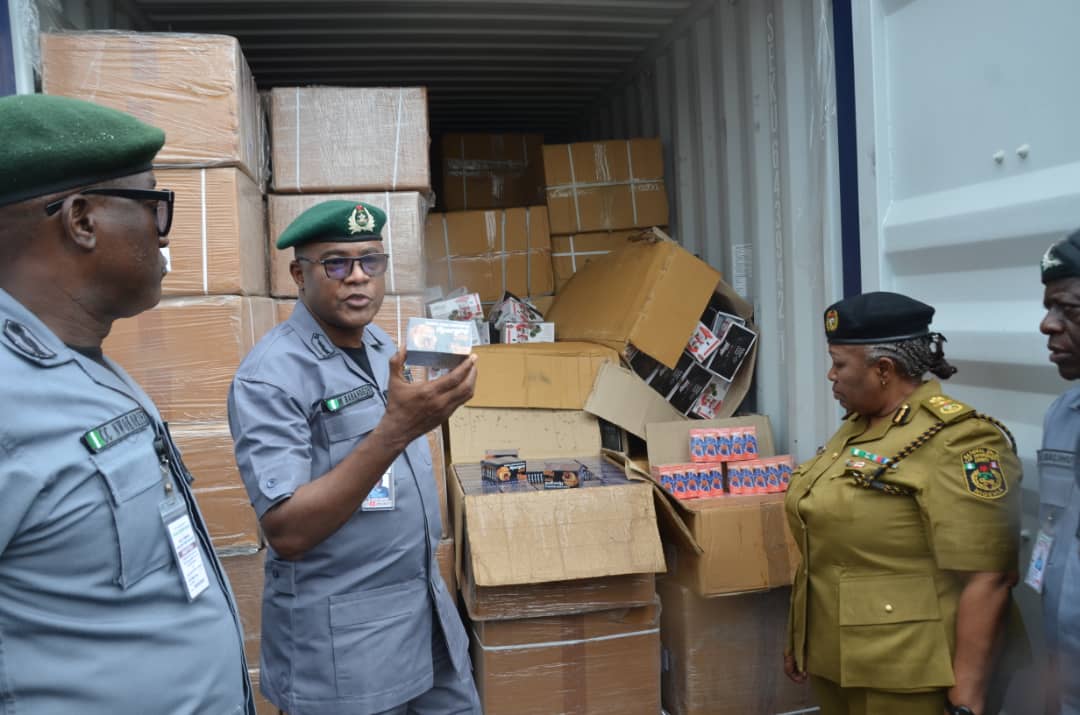Customs Report
‘Our Export Potential Has Capacity To Earn $200bn In 5 Years’ – Babandede

By Eguono Odjegba
The Area Controller of the Nigeria Customs Service, Lilypond Export Command, Comptroller Mohammed Babandede has said the export trading community has the capacity to meet the Central Bank of Nigeria projected $200billion earning from export products between 2023 and 2026.
Babandede told Pinnacle Time that the projected foreign earnings of $200billion from export by the Central Bank of Nigeria in five years is achievable with the right focus and going by prevailing statistics.
This is even as he said the command between January and March this year processed 118,184.96 metric tons of export worth N86,426,279,070.59 with free on-board value (FOB) of $204,656,119.04.
He said the processed export commodities are agricultural produce like Cocoa Beans, Cashew Nuts, Sesame seeds, Hibiscus flower, Soya beans and Ginger. The exported items also include mineral resources such as Lithium Ore, Manganese Ore, and Zircon Sand to mention but a few. Manufactured goods exported are Instant Noodles, Cosmetics, Cigarettes and Beverages.
Speaking further, the export command controller disclosed that with the present Export Processing Terminals (EPTs) arrangement conceived and driven by the Nigeria Customs Service in collaboration with the Nigerian Ports Authority and others, delays hitherto associated with export processing, shipment and late delivery to importing countries often leading to rejection of export commodities, and cancellations of contracts have been drastically reduced.
Babandede expressed optimism that if the present traction in the non oil export based industry is maintained, and Nigerians are able to embrace mechanized farming and the various available support schemes by the federal government and exploit abundant natural resources in the country, she would soon emerge a leading continental and global economy.
He explained that the service has established a one-stop-shop in the command where all relevant government agencies congregate to provide efficient and coordinated documentation and processes of exports.
“That’ was why I said we have been able to reduce the time lag, consignment released from here is final, it is not only customs that is here, the NDLEA here, we have DSS here, we have NAFDAC, we have Produce here, no other agent of these organizations will intervene.
“Once it is treated and is coming from here, it goes straight to the ship. And I’m telling you, this country has the potential to be one of the best economy, not just in Africa, but all over the world. We have the land that can feed the whole of Africa, we can grow so many things. Ivory Coast that is number one in cocoa export is not more than maybe the south western states.

“We can do more than that even on cocoa. And now the CBN also has come up with another export scheme, by the time you are producing, you are able to add value to it. For every dollar that is repatriated back to Nigeria, you get about N35, if you should convert these raw products to semi finish products every quarter, you get N35 per each dollar.
“And the CBN is also expecting with the collaboration of customs, that at least in the next three to five years, there should be repatriation of about $200 billion. And I believe we can do that, we can do that on this products, even we can do more if we can reduce the number of spoilage along the way, right from the farm to warehousing, to the storing area, and to the port.
“If we can reduce the number of storage and we can do more by getting more of the seeds, the more improved varieties, and maybe more fertilizer. We will continue to talk to the farmers, to mechanize their farming, we can do better. And we can add value like this hibiscus instead of us exporting it raw, we can do some real packaging and change it either to tea or to something, then export it over there.
“You will get money from the CBN for repatriation and you will have more value and more money and you create employment opportunities, thereby reducing the social problem of the country.”
He also assured that the export command has the capacity to complete its processes and make exports ready for loading into ships in 48hours.
“Lilypond Export Command despite being a new Command has recorded some achievements, it has drastically reduced delay in export processing. It makes the business of export effective and efficient since all agencies are domiciled in one place as a one stop shop. It has reduced congestion along the access roads to the port and also inside the port terminals, giving space for Import containers. It has reduced cost of Export business. It has reduced the issue of contract cancellation, while the issue of pilfering of cargo has been eliminated. Released containers can access the port within 48hrs for loading onto awaiting vessels.
“The command in collaboration with shipping lines has reduced the turnaround time of a vessel which decreases the cost of shipping. Lilypond Export Command has completely erased the issue of rejection and return of our Agro-produce which is usually caused by delay and lack of requisite phytosanitary certificates.”
Babandede also attributed the impressive performance of the command to strategic engagements with relevant stakeholders; including robust synergy with sister agencies of government.
“In Lilypond Export Command, we have an excellent inter-agency collaboration with other government agencies. I want to appreciate the Nigerian Ports Authority for coming up with the concept of Export Processing Terminals (EPTs) and by providing all the necessary support to the Command.
“I also want to commend the patriotic role of our sister agencies who have always partnered with us in our quest to effectively perform our statutory functions in compliance with extant laws. Since the establishment of this Command, I have been meeting with various stakeholders comprising Terminal Operators, Exporters, Licensed Agents, Freight Forwarders, and Shipping Lines. May I use this medium to reassure our stakeholders that Lilypond Export Command will continue to facilitate their legitimate trade.”

































